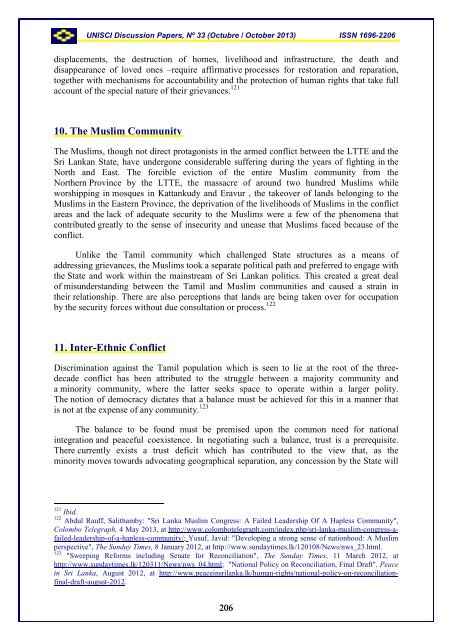UNISCI - Universidad Complutense de Madrid
UNISCI - Universidad Complutense de Madrid
UNISCI - Universidad Complutense de Madrid
Create successful ePaper yourself
Turn your PDF publications into a flip-book with our unique Google optimized e-Paper software.
<strong>UNISCI</strong> Discussion Papers, Nº 33 (Octubre / October 2013) ISSN 1696-2206displacements, the <strong>de</strong>struction of homes, livelihood and infrastructure, the <strong>de</strong>ath anddisappearance of loved ones –require affirmative processes for restoration and reparation,together with mechanisms for accountability and the protection of human rights that take fullaccount of the special nature of their grievances. 12110. The Muslim CommunityThe Muslims, though not direct protagonists in the armed conflict between the LTTE and theSri Lankan State, have un<strong>de</strong>rgone consi<strong>de</strong>rable suffering during the years of fighting in theNorth and East. The forcible eviction of the entire Muslim community from theNorthern Province by the LTTE, the massacre of around two hundred Muslims whileworshipping in mosques in Kattankudy and Eravur , the takeover of lands belonging to theMuslims in the Eastern Province, the <strong>de</strong>privation of the livelihoods of Muslims in the conflictareas and the lack of a<strong>de</strong>quate security to the Muslims were a few of the phenomena thatcontributed greatly to the sense of insecurity and unease that Muslims faced because of theconflict.Unlike the Tamil community which challenged State structures as a means ofaddressing grievances, the Muslims took a separate political path and preferred to engage withthe State and work within the mainstream of Sri Lankan politics. This created a great <strong>de</strong>alof misun<strong>de</strong>rstanding between the Tamil and Muslim communities and caused a strain intheir relationship. There are also perceptions that lands are being taken over for occupationby the security forces without due consultation or process. 12211. Inter-Ethnic ConflictDiscrimination against the Tamil population which is seen to lie at the root of the three<strong>de</strong>ca<strong>de</strong>conflict has been attributed to the struggle between a majority community anda minority community, where the latter seeks space to operate within a larger polity.The notion of <strong>de</strong>mocracy dictates that a balance must be achieved for this in a manner thatis not at the expense of any community. 123The balance to be found must be premised upon the common need for nationalintegration and peaceful coexistence. In negotiating such a balance, trust is a prerequisite.There currently exists a trust <strong>de</strong>ficit which has contributed to the view that, as theminority moves towards advocating geographical separation, any concession by the State will121 Ibid.122 Abdul Rauff, Salithamby: "Sri Lanka Muslim Congress: A Failed Lea<strong>de</strong>rship Of A Hapless Community",Colombo Telegraph, 4 May 2013, at http://www.colombotelegraph.com/in<strong>de</strong>x.php/sri-lanka-muslim-congress-afailed-lea<strong>de</strong>rship-of-a-hapless-community/;Yusuf, Javid: "Developing a strong sense of nationhood: A Muslimperspective", The Sunday Times, 8 January 2012, at http://www.sundaytimes.lk/120108/News/nws_23.html.123"Sweeping Reforms including Senate for Reconciliation", The Sunday Times, 11 March 2012, athttp://www.sundaytimes.lk/120311/News/nws_04.html; "National Policy on Reconciliation, Final Draft", Peacein Sri Lanka, August 2012, at http://www.peaceinsrilanka.lk/human-rights/national-policy-on-reconciliationfinal-draft-august-2012.206
















